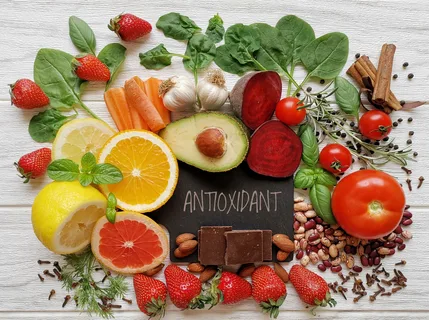Vitamin C, also known as ascorbic acid, is a crucial nutrient for maintaining overall health. It is well-known for its role in supporting the immune system, but its function as a powerful antioxidant is equally important. This guide explores the role of Vitamin C in antioxidant defense, detailing its mechanisms, benefits, and how to ensure adequate intake.
What is Vitamin C?
Chemical Structure and Properties
Vitamin C is a water-soluble vitamin, which means it dissolves in water and is not stored in the body. Its chemical structure allows it to donate electrons readily, making it an effective antioxidant. This ability to donate electrons neutralizes free radicals, reducing oxidative stress.
Natural Sources
Vitamin C is abundant in many fruits and vegetables. Some of the richest sources include:
- Citrus fruits (oranges, lemons, limes)
- Berries (strawberries, blueberries, raspberries)
- Kiwi
- Bell peppers
- Broccoli
- Brussels sprouts
Daily Requirements
The recommended daily allowance (RDA) for Vitamin C varies by age, sex, and life stage. For adults, the RDA is:
- Men: 90 mg/day
- Women: 75 mg/day
- Pregnant women: 85 mg/day
- Breastfeeding women: 120 mg/day
Antioxidant Function of Vitamin C
Mechanism of Action
Vitamin C functions as an antioxidant by donating electrons to neutralize free radicals, which are unstable molecules that can cause cellular damage. This process helps to prevent oxidative stress, a condition linked to numerous chronic diseases.
Protection Against Oxidative Stress
Oxidative stress occurs when there is an imbalance between free radicals and antioxidants in the body. Vitamin C helps to restore this balance, protecting cells and tissues from damage. This protection is vital for maintaining the integrity of DNA, proteins, and lipids.
Regeneration of Other Antioxidants
Vitamin C also plays a role in regenerating other antioxidants, such as Vitamin E. After Vitamin E neutralizes a free radical, it becomes inactive. Vitamin C can reactivate it, allowing it to continue its antioxidant activities.
Health Benefits of Vitamin C as an Antioxidant
Cardiovascular Health
Oxidative stress is a major factor in the development of cardiovascular diseases. Vitamin C’s antioxidant properties help to reduce this stress, potentially lowering the risk of heart disease, hypertension, and stroke. It also supports the production of nitric oxide, which helps to relax blood vessels and improve blood flow.
Immune Function
Vitamin C enhances immune function by supporting various cellular activities of both the innate and adaptive immune systems. Its antioxidant properties help to protect immune cells from oxidative damage, ensuring they function optimally.
Skin Health
Vitamin C is essential for collagen synthesis, which is crucial for maintaining skin health. Its antioxidant properties protect the skin from damage caused by UV radiation and pollution, reducing signs of aging and promoting wound healing.
Eye Health
Oxidative stress is implicated in the development of cataracts and age-related macular degeneration (AMD). Vitamin C helps to protect the eyes by neutralizing free radicals in the lens and retina, potentially reducing the risk of these conditions.
Cancer Prevention
While the relationship between Vitamin C and cancer prevention is complex, its antioxidant properties may help to protect against the development of certain cancers. By reducing oxidative damage to DNA, Vitamin C may lower the risk of mutations that can lead to cancer.
Ensuring Adequate Vitamin C Intake
Dietary Sources
To ensure adequate Vitamin C intake, incorporate a variety of Vitamin C-rich foods into your diet. A balanced diet with plenty of fruits and vegetables can easily meet your daily needs.
Supplementation
While it’s best to get nutrients from food, Vitamin C supplements can help individuals who have difficulty meeting their requirements through diet alone. Supplements are available in various forms, including tablets, capsules, and powders.
Factors Affecting Absorption
Several factors can affect Vitamin C absorption, including:
- Dosage: Higher doses may not be fully absorbed.
- Food matrix: Vitamin C is better absorbed from whole foods than supplements.
- Health status: Certain conditions and medications can affect Vitamin C absorption and utilization.
FAQs
What is the role of Vitamin C in antioxidant defense?
Vitamin C acts as a powerful antioxidant by donating electrons to neutralize free radicals, thereby protecting cells and tissues from oxidative damage. It also regenerates other antioxidants, enhancing overall antioxidant defense.
How does Vitamin C help in reducing oxidative stress?
Vitamin C reduces oxidative stress by neutralizing free radicals, preventing them from causing cellular damage. This helps to maintain the integrity of DNA, proteins, and lipids, reducing the risk of chronic diseases.
Can Vitamin C supplements replace a healthy diet?
While supplements can help to ensure adequate intake, they should not replace a healthy diet. Whole foods provide a complex matrix of nutrients and bioactive compounds that work together to support health.
What are the symptoms of Vitamin C deficiency?
Vitamin C deficiency can lead to scurvy, a condition characterized by fatigue, gum disease, joint pain, and poor wound healing. Severe deficiency can be life-threatening if left untreated.
Is it possible to consume too much Vitamin C?
Vitamin C is generally safe, but excessive intake can cause side effects such as diarrhea, nausea, and abdominal cramps. The upper limit for adults is 2,000 mg/day.
How does Vitamin C support skin health?
Vitamin C supports skin health by promoting collagen synthesis, protecting against UV damage, and reducing oxidative stress. It helps to maintain skin elasticity, reduce wrinkles, and promote wound healing.
Can Vitamin C help to prevent colds?
Vitamin C can help to reduce the severity and duration of colds, especially in individuals under physical stress. However, it does not prevent colds in the general population.
What is the best way to take Vitamin C supplements?
Vitamin C supplements are best taken with meals to enhance absorption. Dividing the dose throughout the day can also improve absorption and reduce the risk of gastrointestinal side effects.
How does Vitamin C interact with other antioxidants?
Vitamin C works synergistically with other antioxidants, such as Vitamin E. It helps to regenerate oxidized Vitamin E, allowing it to continue its antioxidant activities.
Are there any medical conditions that affect Vitamin C requirements?
Certain medical conditions, such as chronic diseases, infections, and surgeries, can increase the body’s need for Vitamin C. Individuals with these conditions should consult their healthcare provider to determine their specific needs.
Conclusion
Vitamin C plays a vital role in antioxidant defense, protecting the body from oxidative stress and supporting overall health. Ensuring adequate intake through a balanced diet rich in fruits and vegetables, or through supplementation if necessary, can help to maintain optimal health and prevent chronic diseases. By understanding the importance of Vitamin C and incorporating it into your daily routine, you can harness its powerful benefits for a healthier life
- Smokers Lines Lip & Mouth Fillers Near Laleham, Surrey - May 31, 2025
- What Is Toxic Positivity And How It Hurts Relationships - May 31, 2025
- Light Eyes Ultra – Dark Circles Treatment Near Mickleham, Surrey - May 30, 2025

